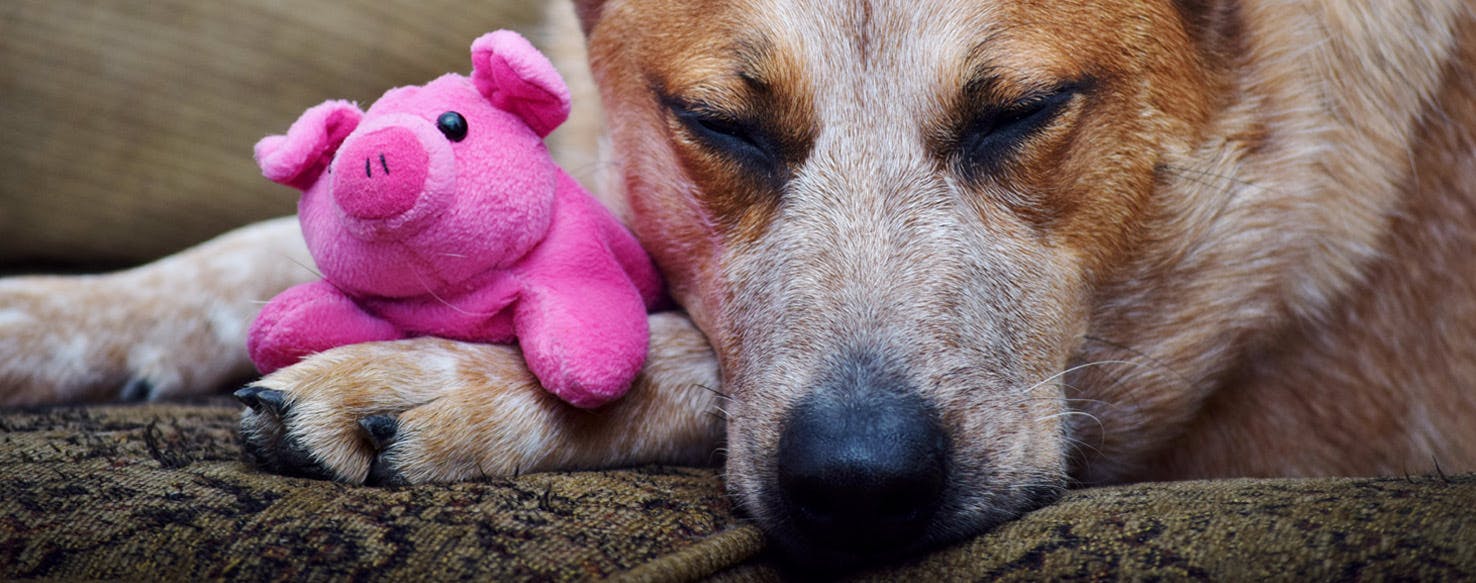- Home
- The Daily Wag!
- Behavior
- Why Dogs Like Pig Ears

Common
Normal
Let's face it, our canines love to chew. It's natural and beneficial for helping to keep those pearly whites, well, pearly and white. However, if you don't give them something of their own they will find something to chew. Edible alternatives are one of the top choices, but with so many things to choose from how do you know which is best. While there is no "one size fits all" when it comes to treats, almost all dogs love those crunchy pig ears. These are usually a rather inexpensive option for a savory treat to give to your pup. But if you are like me, you ask yourself why do dogs like pig ears so much?! And are they safe for your pet?
So what is that attracts dogs to pig ears? Unfortunately, there is not much research available on the topic to give a definitive answer. There are, however, a few experts who have given their opinions on the matter. The most common belief is that dogs love pig ears because of the crunchy, meaty taste. Whether the pig ears are natural or have been flavored, most dogs find them irresistible as a treat option. One thing to be mindful of is whether your dog can handle an entire pig ear due to their size. Large treats should be broken into pieces before giving them to a smaller dog. As with most things when it comes to canines, the first attraction is usually the smell. The meaty scent makes them go bonkers as soon as they catch that first whiff. Even though dogs are omnivores, most seem to never be able to resist meat no matter what! And since meat is a great source of protein for your dog, making sure they receive plenty of it is important. Protein is, of course, one of the most important components in a dog's diet. Many experts agree that protein is essential in all aspects of the development and growth of your pup. Another major benefit that dogs get from pig ears is dental hygiene. Since pig ears are so crunchy, they can help to remove plaque and food residue from your pooch's teeth. Some experts have gone on to say that there is even a lower risk of injury to your dog's mouth with pig ears vs. products made from cow. They attribute this to the fact that pork is much softer than cowhide. This in turn makes pig ear treats easier on the gums and teeth. Additionally, the treats being a bit softer than some other chews means there is also a lower chance of tooth fracture.
Need advice about your pet's health?
Get answers fast from a veterinary professional 24/7 in the Wag! App.
Get Vet ChatWhile not all experts agree that pig ears are safe, most concede that the occasional ear is not harmful if precautions are taken. Being mindful of any additives listed on the label is always a good start. If you are not comfortable with the ears found in most pet stores, you can prepare pig ears at home. With just a bit of time and effort you can give your fur baby one of their favorite treats, knowing that there isn't anything extra in them. As is the case with any treat, moderation is key. We all want to spoil our little furry friends rotten, but too much of a good thing can be bad for them. Make sure that when you do give Rover one of those savory pig ears, he or she is aware that it is a special treat. Even though it has been stated that pig ears are safer than some other chews, this doesn't leave the door open to letting your pup have them anytime they want. Also, be conscious of the fact that there are risks associated with most all chew treats, including pig ears. You should monitor them while they are enjoying their chew, especially if your dog is a smaller breed. Pig ears, like many other treats, can pose a choking hazard if not broken into manageable size pieces for your little one to consume.
There are some health concerns associated with pig ears that you should be aware of before deciding whether or not to include them on your dog's menu. A few of the top concerns experts warn of are salmonella, upset digestive system, high calories, and allergies. With over 4% of commercially produced pig ears having salmonella, this ranks near the top, and for reasons that may surprise you. A big concern in regard to salmonella is that it not only affects your dog, but can also affect humans in the household. Especially young children. Storing the pig ears properly is very important if you choose to have them on hand. While they should definitely be kept out of the reach of any children, pig ears should also be kept under proper conditions. Salmonella decreases more slowly when items are refrigerated. Therefore, pig ears should be kept at room temperatures.
If you decide in favor of having pig ears available for your fur baby, keep in mind that after the first bite, they are sure to be begging for more. So be prepared, and enjoy watching your baby have a doggone good time devouring the savory crunchiness of pig ears as a special treat.
Written by a Shiba Inu lover Patty Oelze
Veterinary reviewed by:
Published: 02/07/2018, edited: 01/30/2020
More articles by Patty Oelze

